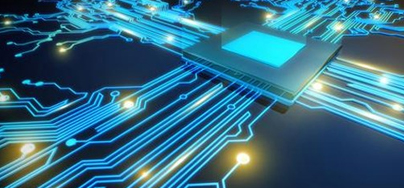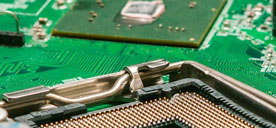AI leads the “core economy”: the cutting-edge trend in the digital era
2023/9/27 12:00:10
Views:
Across the world, AI is ushering in a new era of growth. At the heart of this new era is computing power, which plays a vital role in ensuring a better future for everyone. This view is Intel Corporation As highlighted by CEO Pat Gelsinger in his keynote speech at the Intel on Technology Innovation Conference on September 19, 2023. Gelsinger introduced the impact of AI on the "Siliconomy" Promoting role, the "core economy" is defined as an economic form that continues to grow driven by chips and software. At the same time, Intel has also integrated AI capabilities in its various hardware products and through open\multi-architecture software solutions To promote the popularization of AI applications.
What is the "core economy"? By definition, the term "core economy" encompasses the structure and way of life in the new era of globalization, as well as computing as the cornerstone to provide everyone with greater opportunities for success and a better future. Opportunity. On the other hand, it also points to an evolving economy driven by the magical power of chips, with semiconductors becoming a key element in maintaining the scale and growth of modern economies. Pat Kissinger previously spoke on The Stern Stewart Institute think tank Published a guest signed article titled "Welcome to the Silicone Economy", explaining in detail his understanding of the concept of "core economy". The following is a re-creation of the content of the article :
Welcome to the era of "core economy"
Author: Pat Kissinger, CEO of Intel Corporation
Humanity has always cherished a never-ending desire to move forward through continuous exploration and innovation. Our ability to learn from each other and to integrate and draw on the ideas of our predecessors has shaped today's world, a world that was previously unimaginable. world.
As we move forward, our needs for technology continue to increase.
At present, people and technology are very closely related, which is reflected in the huge impact of computing in modern life. To date, computing has been a source of information, a way to increase productivity and the root of entertainment. However, the role of computing is undergoing With fundamental changes, it has involved all aspects of the economy and human existence. Computing is entering a new era, and systems driven by AI will be given autonomy and initiative to assist us in completing tasks based on knowledge and physical labor. tasks and become part of the environment around us. We need to continue to invest in driving new\more energy-efficient\domain-specific architectures, such as in-memory computing\neuromorphic computing and quantum computing.
Chips are the foundation of digitalization. Currently, the digital economy accounts for more than 15% of global GDP. In the past ten years, the GDP growth rate of the digital economy has been 2.5 times that of the real economy.
I firmly believe that every company should be considered a technology company. In the new "core economy" era, technology has become the benchmark for success. Looking forward to the next few decades, we will see everything becoming increasingly digital, including work\study\ Faith\Growth\Interpersonal communication and ways of caring for others.
As advanced semiconductor technology drives human achievement to new heights, the global demand for computing is also growing exponentially in inverse proportion to chip size, cost and power consumption. This is exactly what the famous Moore's Law states. The number of transistors on the computer doubles every two years).
Technology is often seen as a tool, often developed to solve current challenges or meet needs, whether to increase productivity, increase efficiency or provide convenience. At the dawn of the information age, business, academia and government are working together to Collaboration, based on the development of the PC\Internet and the web, has created a globalized society that has brought our world into what it is today. We must work together again to shape the future of technological development by co-creating new possibilities , to unleash the greatest potential of human beings.
We should embrace a more open design that supports rapid innovation leveraging heterogeneous modules on standardized interfaces. A diverse open ecosystem enables it to remain resilient, albeit not perfect, in challenging times
But it is more able to find balance in chaos. As the number of applications increases, more new ideas are born, further promoting the development of applications and innovation. However, we must also ensure that the advancement of technology is responsible. The responsibility lies not only in the development of technology, but also in its application. For example, artificial intelligence (AI) has begun to take on tasks that traditional computing cannot handle, and machines will soon make more decisions. Therefore, we must ensure that in AI The design incorporates human supervision and coordination.
Five "super technological forces" promote the rise of the "core economy"
Our innovation and forward momentum have created the "core economy", in which everyone plays an important role, and everyone participates in the economic prosperity driven by the magical power of chips.
I often say that we are shaping the world, giving rise to the "core economy", a new era driven by five "super technological forces":
1. Computing: Everything is equivalent to a computer, and the computing method defines the way we perceive the world.
2. Connection: Everyone and everything is connected.
3. Infrastructure: We are building a dynamic\reliable path for storing and interconnecting computing data, combining unlimited scale with comprehensive coverage while meeting the demand for lower latency and higher bandwidth.
4. Sensing and perception: Low-cost\high-resolution sensors have made major breakthroughs, capable of acquiring large amounts of data from edge smart devices, and combined with advancements in automation\processing\inference and software technology, giving machines human-centered capabilities. This turns human weaknesses into digitally enhanced strengths.
5. Artificial Intelligence (AI): With ubiquitous intelligence, AI transforms massive data into actionable insights. Data and computing make AI algorithms more sophisticated in prediction and creation.
These basic technologies have built a bridge for us from the analog era to the digital era, profoundly changing the way we perceive the world.
Today, a new economic system is taking shape through highly distributed edge-to-cloud computing platforms. Despite the challenges facing economic growth around the world, the "core economy" still clearly shows that tiny chips are essential to sustaining the modern economy. Scale and enabling growth are critical. Therefore, we must work together to meet the future surge in computing demand. This era, the era of the "core economy", ushered in new opportunities and challenges that will continue to shape us. the future.
What is the "core economy"? By definition, the term "core economy" encompasses the structure and way of life in the new era of globalization, as well as computing as the cornerstone to provide everyone with greater opportunities for success and a better future. Opportunity. On the other hand, it also points to an evolving economy driven by the magical power of chips, with semiconductors becoming a key element in maintaining the scale and growth of modern economies. Pat Kissinger previously spoke on The Stern Stewart Institute think tank Published a guest signed article titled "Welcome to the Silicone Economy", explaining in detail his understanding of the concept of "core economy". The following is a re-creation of the content of the article :
Welcome to the era of "core economy"
Author: Pat Kissinger, CEO of Intel Corporation
Humanity has always cherished a never-ending desire to move forward through continuous exploration and innovation. Our ability to learn from each other and to integrate and draw on the ideas of our predecessors has shaped today's world, a world that was previously unimaginable. world.
As we move forward, our needs for technology continue to increase.
At present, people and technology are very closely related, which is reflected in the huge impact of computing in modern life. To date, computing has been a source of information, a way to increase productivity and the root of entertainment. However, the role of computing is undergoing With fundamental changes, it has involved all aspects of the economy and human existence. Computing is entering a new era, and systems driven by AI will be given autonomy and initiative to assist us in completing tasks based on knowledge and physical labor. tasks and become part of the environment around us. We need to continue to invest in driving new\more energy-efficient\domain-specific architectures, such as in-memory computing\neuromorphic computing and quantum computing.
Chips are the foundation of digitalization. Currently, the digital economy accounts for more than 15% of global GDP. In the past ten years, the GDP growth rate of the digital economy has been 2.5 times that of the real economy.
I firmly believe that every company should be considered a technology company. In the new "core economy" era, technology has become the benchmark for success. Looking forward to the next few decades, we will see everything becoming increasingly digital, including work\study\ Faith\Growth\Interpersonal communication and ways of caring for others.
As advanced semiconductor technology drives human achievement to new heights, the global demand for computing is also growing exponentially in inverse proportion to chip size, cost and power consumption. This is exactly what the famous Moore's Law states. The number of transistors on the computer doubles every two years).
Technology is often seen as a tool, often developed to solve current challenges or meet needs, whether to increase productivity, increase efficiency or provide convenience. At the dawn of the information age, business, academia and government are working together to Collaboration, based on the development of the PC\Internet and the web, has created a globalized society that has brought our world into what it is today. We must work together again to shape the future of technological development by co-creating new possibilities , to unleash the greatest potential of human beings.
We should embrace a more open design that supports rapid innovation leveraging heterogeneous modules on standardized interfaces. A diverse open ecosystem enables it to remain resilient, albeit not perfect, in challenging times
But it is more able to find balance in chaos. As the number of applications increases, more new ideas are born, further promoting the development of applications and innovation. However, we must also ensure that the advancement of technology is responsible. The responsibility lies not only in the development of technology, but also in its application. For example, artificial intelligence (AI) has begun to take on tasks that traditional computing cannot handle, and machines will soon make more decisions. Therefore, we must ensure that in AI The design incorporates human supervision and coordination.
Five "super technological forces" promote the rise of the "core economy"
Our innovation and forward momentum have created the "core economy", in which everyone plays an important role, and everyone participates in the economic prosperity driven by the magical power of chips.
I often say that we are shaping the world, giving rise to the "core economy", a new era driven by five "super technological forces":
1. Computing: Everything is equivalent to a computer, and the computing method defines the way we perceive the world.
2. Connection: Everyone and everything is connected.
3. Infrastructure: We are building a dynamic\reliable path for storing and interconnecting computing data, combining unlimited scale with comprehensive coverage while meeting the demand for lower latency and higher bandwidth.
4. Sensing and perception: Low-cost\high-resolution sensors have made major breakthroughs, capable of acquiring large amounts of data from edge smart devices, and combined with advancements in automation\processing\inference and software technology, giving machines human-centered capabilities. This turns human weaknesses into digitally enhanced strengths.
5. Artificial Intelligence (AI): With ubiquitous intelligence, AI transforms massive data into actionable insights. Data and computing make AI algorithms more sophisticated in prediction and creation.
These basic technologies have built a bridge for us from the analog era to the digital era, profoundly changing the way we perceive the world.
Today, a new economic system is taking shape through highly distributed edge-to-cloud computing platforms. Despite the challenges facing economic growth around the world, the "core economy" still clearly shows that tiny chips are essential to sustaining the modern economy. Scale and enabling growth are critical. Therefore, we must work together to meet the future surge in computing demand. This era, the era of the "core economy", ushered in new opportunities and challenges that will continue to shape us. the future.
Related Information
-
-
Phone
+86 135 3401 3447 -
Whatsapp




